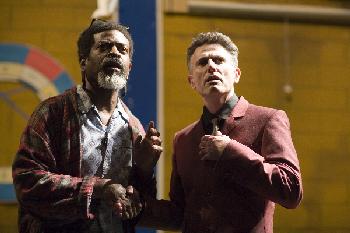SITE GUIDE
SEARCH
REVIEWS
FEATURES
NEWS
Etcetera and
Short Term Listings
LISTINGS
Broadway
Off-Broadway
NYC Restaurants
BOOKS and CDs
OTHER PLACES
Berkshires
London
California
DC
Philadelphia
Elsewhere
QUOTES
On TKTS
PLAYWRIGHTS' ALBUMS
LETTERS TO EDITOR
FILM
LINKS
MISCELLANEOUS
Free Updates
Masthead
Writing for Us
A CurtainUp Review
Faust, Parts I & II
by Les
Gutman
|
One mind is worth a thousand hands. ---Faust |
 W. Badgett and D. Greenspan
(Photo: Jill Jones) |
The first half of this magnum opus was presented as two "work-in-progress" productions by Target Margin, in 2004 and 2005. We reviewed both, and those reviews are linked below. In the United States, it's by far the exception rather than the rule that theater companies have the luxury of fine-tuning their work in this way. (In Europe, with state-supported culture, it is far more common.) The benefit of this intensive process is demonstrable in the result. Ideas that no doubt seemed good in advance, but which didn't work well in execution, have been jettisoned; casting has been adjusted; and the story is now told with clarity and fine pacing. (Which is saying something for a show of this length.)
The basic details of Part I are that, after some introductions, Faust (Will Badgett -- the younger version of Faust is played in the middle of the production by Ty Jones) makes his legendary deal with the Devil, Mephistopheles (David Greenspan): if the Devil can satisfy Faust on earth, he owns Faust's soul for eternity. After some exposure to what the world offers, the particular desire Faust seeks to satisfy is gaining the affection of a girl he spots -- Gretchen (Eunice Wong). Though Mephistopheles succeeds in delivering the girl, it ends badly. Part I concludes with Gretchen -- who has become pregnant in the process -- killing her baby and dying.
The second part of Faust was workshopped late in 2005, though it was not open to review. There is, therefore, no "before" shot with which to compare it. What can be said is that the second part of the work presents challenges that are not present in the first. Much like Ibsen's Peer Gynt, it is frequently said to be a "closet drama" -- a play to be read rather than seen.
Much of Part II consists of an allegorical/fantasy/LSD trip journey that Faust takes with Mephisto -- along the way coming in contact with (among many others) an emperor (of Germany, though that's only implied here), Helen of Troy, Paris and a test tube baby named Homunculus (Lian-Marie Holmes). They travel to a Classical Walpurgis Night in Greece, to Arcadia, to the palace of Menelaus, to the land of the mothers as well as a variety of other destinations. But this is not just a pleasure trip -- with Mephisto, Faust manages to do quite a bit of work: at one point inventing paper money, and at another reclaiming land from the sea. It's not really until the fifth and final act of Part II that the story (and the production) regains the intelligibility of Part I. And then Faust, old and blind, dies, his soul (not without a fight on the Devil's part) ascending to Heaven.
Nothing ventured, nothing gained, but it's pretty rough going there for a while, and it can't be said that Target Margin has made a strong case against the prevailing wisdom that Faust II is unstageable. I might add that Douglas Langworthy's translation is just that. It might have been more interesting to see what Langworthy and director David Herskovits could have achieved with a less literal adaptation that separated the wheat from the chaff of Goethe's writing.

|
The performances are generally quite good. Casting Mr. Greenspan as the devil is making a very distinctive choice. In Faust in Love, I complained that his unmistakable persona overtook his character, but I'm happy to say that the two now seem to appear in a good balance. The partners in the role of Faust (Mr. Badgett and Mr. Jones) both do fine work, though Ty Jones certainly has the greater facility with the play's language. Of the remaining cast members (all of whom play multiple parts), Lian-Marie Holmes and Wayne Alon Scott distinguish themselves.
Goethe was a true Renaissance man, with interests in science, philosophy, history, law, politics and of course literature. Faust is filled with autobiographical elements, though obviously there is much in it that was not drawn from life. It was a life's work, and one has the sense that, like Faust, Goethe believed he had to know everything to know anything and yet that to know everything is to know nothing. It's quite an experience to witness this distillation of a life's trials and tribulations, and at the same time the trials and tribulations of finding a way to depict them on the stage.
LINKS TO TARGET MARGIN'S ORIGINAL DEVELOPMENT OF FAUST
These Very Serious Jokes
Faust in Love
|
Faust, Parts I & II
by Johann Wofgang von Goethe, translated by Douglas LangworthyDirected by David Herskovits with Will Badgett, Aysan Çelik, Daphne Gaines, David Greenspan, George Hannah, Lian-Marie Holmes, Ty Jones, E. C. Kelly, Wayne Alon Scott and Eunice Wong Set Design: Carol Bailey Costume Design: Kaye Voyce Lighting Design: Lenore Doxsee Sound Design: John Collins Original music by Katie Down, with additional music by John King Running time: Part I - 2 hours, 55 minutes with 1 intermission; Part II - 3 hours with 1 intermission A production of Target Margin Theater Classic Stage Company, 136 East 13th Street (3/4 Avs) Telephone (212) 279-4200 Opening April 30, 2006, closes May 20, 2006 Part I performed 5/3, 5/5, 5/11, 5/12 and 5/17 @7:30, Part II performed 5/4, 5/10 and 5/18 @7:30, both parts performed 5/6, 5/7, 5/13, 5/14 and 5/19 @2 and 7:30 and also 5/20 @4:30 and 10; tickets for one part are $35-40, tickets for both parts are $55, with single student tickets for $20 except FRI and SAT evenings Reviewed by Les Gutman based on 4/24/06 performance |

6, 500 Comparative Phrases including 800 Shakespearean Metaphors by our editor.
Click image to buy.
Go here for details and larger image.






